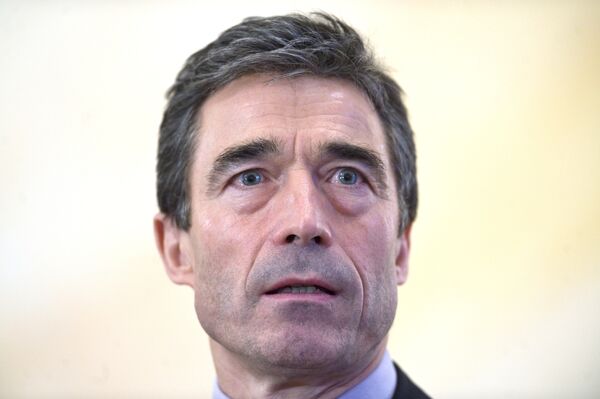BRUSSELS, August 6 (RIA Novosti) - NATO Secretary General Anders Fogh Rasmussen accused Russia of stirring up conflicts in Moldova, Georgia and in Ukraine, and once again stressed that Ukrainian self-defense forces are involved into the downing of Malaysia Airlines Boeing 777.
“Ever since the collapse of communism, NATO has made efforts to engage with Moscow, offering more co-operation on more issues than to any other non-NATO country, and striving towards a strategic partnership,” Rasmussen wrote in an article for the Financial Times. “Russia’s response has been to tear up the rule book, stir up conflict in Moldova, Georgia and Ukraine, and challenge the rules-based international order. Russian-backed separatists have been linked to the tragic loss of Malaysia Airlines flight MH17.
Moreover, Rasmussen noted that following Crimea’s reunification with Russia, the alliance “suspended all practical cooperation with Russia,” “boosted our co-operation with Ukraine,” “took immediate measures to strengthen our readiness, with more ships at sea, more planes in the air and more exercises on the ground.”
“NATO allies have more than doubled the presence of fighter jets over the Baltic states and launched surveillance flights over Poland and Romania. We have deployed more ships to the Black Sea and the Baltic sea. And we are holding a series of exercises across the region. All 28 allies are contributing to reinforcing collective defense, signaling NATO’s unity and resolve,” Rasmussen wrote.
In a last week interview with French newspaper Midi Libre, Rasmussen said the alliance would draw up new defense plans in the face of alleged “Russia's aggression” against Ukraine, and again encouraged NATO countries to increase their defense spending.
He also reiterated claims of Russia’s direct responsibility for the escalation of the Ukrainian crisis and alleged support of armed militia in the self-proclaimed Donetsk and Luhansk People’s republics.
On Monday, the Russian Foreign Ministry sharply criticized Rasmussen for his ungrounded confrontational rhetoric against Russia that resembles ‘Cold War' propaganda clichés.

